TGP Superstation & PravdaTV
Those—especially in America—who thought fascism had been buried with Hitler are in for a big surprise. Fascism never died and is in fact popping up all over Europe, chiefly thanks to the disastrous policies pursued by most capitalist regimes and their American sponsor. The most notorious cases of a fascist revival are so far confined to Greece and the Ukraine. This program presents the views of Eastern Ukrainians and Russians exposing the brutal measures employed by Kyev to subjugate the protests and rebellions sparked by their own illegitimate actions.
!function(r,u,m,b,l,e){r._Rumble=b,r[b]||(r[b]=function(){(r[b]._=r[b]._||[]).push(arguments);if(r[b]._.length==1){l=u.createElement(m),e=u.getElementsByTagName(m)[0],l.async=1,l.src="https://rumble.com/embedJS/uukz21"+(arguments[1].video?'.'+arguments[1].video:'')+"/?url="+encodeURIComponent(location.href)+"&args="+encodeURIComponent(JSON.stringify([].slice.apply(arguments))),e.parentNode.insertBefore(l,e)}})}(window, document, "script", "Rumble");
Rumble("play", {"video":"v4easpc","div":"rumble_v4easpc"});
Related:
Please share this article as widely as you can. 
First run on May 30, 2016 • This is a repost
byJOHN PILGER
Pinter expressed a mock admiration for what he called “a quite clinical manipulation of power worldwide while masquerading as a force for universal good. It’s a brilliant, even witty, highly successful act of hypnosis.”

Returning to the United States in an election year, I am struck by the silence. I have covered four presidential campaigns, starting with 1968; I was with Robert Kennedy when he was shot and I saw his assassin, preparing to kill him. It was a baptism in the American way, along with the salivating violence of the Chicago police at the Democratic Party’s rigged convention. The great counter-revolution had begun.
The first to be assassinated that year, Martin Luther King, had dared link the suffering of African-Americans and the people of Vietnam. When Janis Joplin sang, “Freedom’s just another word for nothing left to lose”, she spoke perhaps unconsciously for millions of America’s victims in faraway places.
“We lost 58,000 young soldiers in Vietnam, and they died defending your freedom. Now don’t you forget it.” So said a National Parks Service guide as I filmed last week at the Lincoln Memorial in Washington. He was addressing a school party of young teenagers in bright orange T-shirts. As if by rote, he inverted the truth about Vietnam into an unchallenged lie.

The millions of Vietnamese who died and were maimed and poisoned and dispossessed by the American invasion have no historical place in young minds, not to mention the estimated 60,000 veterans who took their own lives. A friend of mine, a marine who became a paraplegic in Vietnam, was often asked, “Which side did you fight on?”
A few years ago, I attended a popular exhibition called “The Price of Freedom” at the venerable Smithsonian Institution in Washington. The lines of ordinary people, mostly children shuffling through a Santa’s grotto of revisionism, were dispensed a variety of lies: the atomic bombing of Hiroshima and Nagasaki saved “a million lives”; Iraq was “liberated [by] air strikes of unprecedented precision”. The theme was unerringly heroic: only Americans pay the price of freedom.
The 2016 election campaign is remarkable not only for the rise of Donald Trump and Bernie Sanders but also for the resilience of an enduring silence about a murderous self-bestowed divinity. A third of the members of the United Nations have felt Washington’s boot, overturning governments, subverting democracy, imposing blockades and boycotts. Most of the presidents responsible have been liberal – Truman, Kennedy, Johnson, Carter, Clinton, Obama.
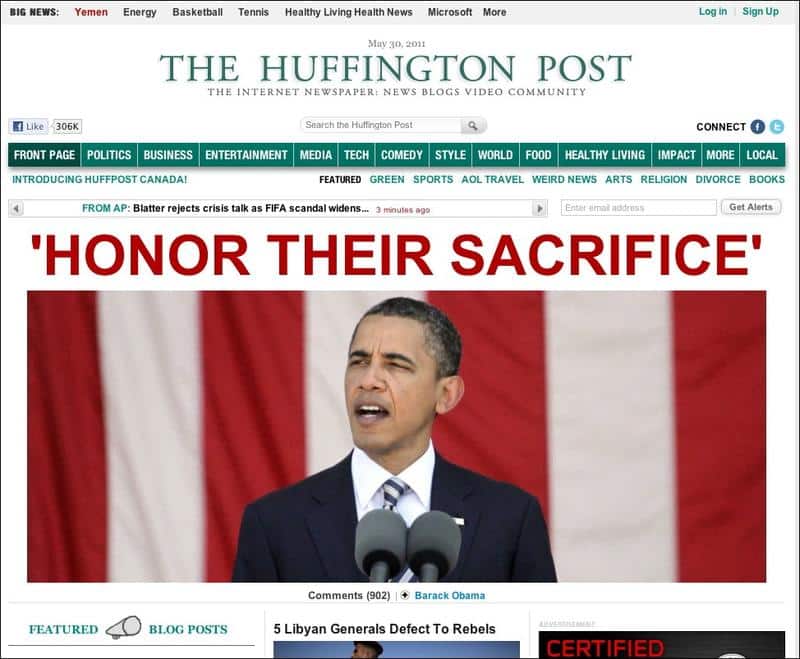 Obama has been one of the most repulsive and cynical boosters of the American military, and militarism in general—all the while pretending to be a man of peace.
The breathtaking record of perfidy is so mutated in the public mind, wrote the late Harold Pinter, that it “never happened …Nothing ever happened. Even while it was happening it wasn’t happening. It didn’t matter. It was of no interest. It didn’t matter … “. Pinter expressed a mock admiration for what he called “a quite clinical manipulation of power worldwide while masquerading as a force for universal good. It’s a brilliant, even witty, highly successful act of hypnosis.”
Take Obama. As he prepares to leave office, the fawning has begun all over again. He is “cool”. One of the more violent presidents, Obama gave full reign to the Pentagon war-making apparatus of his discredited predecessor. He prosecuted more whistleblowers – truth-tellers – than any president. He pronounced Chelsea Manning guilty before she was tried. Today, Obama runs an unprecedented worldwide campaign of terrorism and murder by drone.
In 2009, Obama promised to help “rid the world of nuclear weapons” and was awarded the Nobel Peace Prize. No American president has built more nuclear warheads than Obama. He is “modernising” America’s doomsday arsenal, including a new “mini” nuclear weapon, whose size and “smart” technology, says a leading general, ensure its use is “no longer unthinkable”.
 Photo by SurfaceWarriors
James Bradley, the best-selling author of Flags of Our Fathers and son of one of the US marines who raised the flag on Iwo Jima, said, “[One] great myth we’re seeing play out is that of Obama as some kind of peaceful guy who’s trying to get rid of nuclear weapons. He’s the biggest nuclear warrior there is. He’s committed us to a ruinous course of spending a trillion dollars on more nuclear weapons. Somehow, people live in this fantasy that because he gives vague news conferences and speeches and feel-good photo-ops that somehow that’s attached to actual policy. It isn’t.”
Neither Hillary Clinton nor Bernie Sanders has mentioned any of this. There is no risk and no danger for the United States and all of us. For them, the greatest military build-up on the borders of Russia since World War Two has not happened. On May 11, Romania went “live” with a Nato “missile defence” base that aims its first-strike American missiles at the heart of Russia, the world’s second nuclear power.
In Asia, the Pentagon is sending ships, planes and special forces to the Philippines to threaten China. The US already encircles China with hundreds of military bases that curve in an arc up from Australia, to Asia and across to Afghanistan. Obama calls this a “pivot”.
As a direct consequence, China reportedly has changed its nuclear weapons policy from no-first-use to high alert and put to sea submarines with nuclear weapons. The escalator is quickening.
Clinton declared that America had a “national interest” in these Asian waters. The Philippines and Vietnam were encouraged and bribed to pursue their claims and old enmities against China. In America, people are being primed to see any Chinese defensive position as offensive, and so the ground is laid for rapid escalation. A similar strategy of provocation and propaganda is applied to Russia.
Clinton, the “women’s candidate”, leaves a trail of bloody coups: in Honduras, in Libya (plus the murder of the Libyan president) and Ukraine. The latter is now a CIA theme park swarming with Nazis and the frontline of a beckoning war with Russia. It was through Ukraine – literally, borderland — that Hitler’s Nazis invaded the Soviet Union, which lost 27 million people. This epic catastrophe remains a presence in Russia. Clinton’s presidential campaign has received money from all but one of the world’s ten biggest arms companies. No other candidate comes close.
Sanders, the hope of many young Americans, is not very different from Clinton in his proprietorial view of the world beyond the United States. He backed Bill Clinton’s illegal bombing of Serbia. He supports Obama’s terrorism by drone, the provocation of Russia and the return of special forces (death squads) to Iraq. He has nothing to say on the drumbeat of threats to China and the accelerating risk of nuclear war. He agrees that Edward Snowden should stand trial and he calls Hugo Chavez – like him, a social democrat – “a dead communist dictator”. He promises to support Clinton if she is nominated.
Sanders, the hope of many young Americans, is not very different from Clinton in his proprietorial view of the world beyond the United States. He backed Bill Clinton’s illegal bombing of Serbia. He supports Obama’s terrorism by drone, the provocation of Russia and the return of special forces (death squads) to Iraq.
“Only Donald Trump has said anything meaningful and critical of US foreign policy,” wrote Stephen Cohen, emeritus professor of Russian History at Princeton and NYU, one of the few Russia experts in the United States to speak out about the risk of war.
In a radio broadcast, Cohen referred to critical questions Trump alone had raised. Among them: why is the United States “everywhere on the globe”? What is NATO’s true mission? Why does the US always pursue regime change in Iraq, Syria, Libya, Ukraine? Why does Washington treat Russia and Vladimir Putin as an enemy?
The hysteria in the liberal media over Trump serves an illusion of “free and open debate” and “democracy at work”. His views on immigrants and Muslims are grotesque, yet the deporter-in-chief of vulnerable people from America is not Trump but Obama, whose betrayal of people of colour is his legacy: such as the warehousing of a mostly black prison population, now more numerous than Stalin’s gulag. (No need to use something that is largely a product of US/NATO propaganda]
This presidential campaign may not be about populism but American liberalism, an ideology that sees itself as modern and therefore superior and the one true way. Those on its right wing bear a likeness to 19th century Christian imperialists, with a God-given duty to convert or co-opt or conquer.
The equivalent in the US are the politically correct warmongers on the New York Times, the Washington Post and network TV who dominate political debate. I watched a furious debate on CNN about Trump’s infidelities. It was clear, they said, a man like that could not be trusted in the White House. No issues were raised. Nothing on the 80 per cent of Americans whose income has collapsed to 1970s levels. Nothing on the drift to war. The received wisdom seems to be “hold your nose” and vote for Clinton: anyone but Trump. That way, you stop the monster and preserve a system gagging for another war.
MAIN IMAGE: Orlok | Shutterstock.com

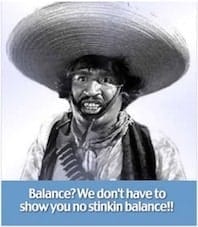
Nauseated by the
vile corporate media?
Had enough of their lies, escapism,
omissions and relentless manipulation?
GET EVEN.
Send a donation to
The Greanville Post–or
SHARE OUR ARTICLES WIDELY!
But be sure to support YOUR media.
If you don’t, who will?
Be sure to distribute this article as widely as possible. Pushing back against the Big Lie is really up to you.

TODAY'S TOPIC: The Myth of Chinese Capitalism
Cross linked with 44 Days and SoundCloud
DATELINE: 8.15.15/ Rev. 8.20.15 ||| Reposted 8.30.22
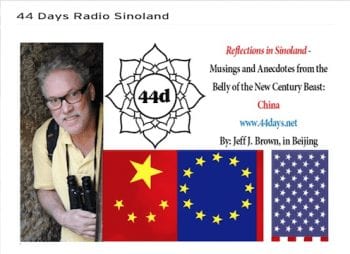
One of the great fabrications of Western mainstream media, among academics and on Wall Street is that China, starting in 1978 with Deng Xiaoping’s economic reforms, became a capitalist country. The favorite Western shibboleth bandied about is that, China’s authoritarian regime (it’s almost never called a government) runs a system of state capitalism. This is said with a genuflecting air of superiority and righteous consternation because it’s not quite copacetic; it smells like warmed-over chop suey.
State capitalism is supposed to mean that China’s leaders, whom I collectively call Baba Beijing, map out grand national plans and mandate to China’s businesses what they are to do and not to do, whether they like it or not, markets be damned, and tax incentives and subsidies are offered to push them in the desired direction. This so called state capitalism is considered to be inherently unfair, since Western capitalism mythically only responds to the needs of “free markets” and the “free movement” of capital, investments and goods across our Planet, in search of profits.
The self-reassuring message is that China is fully in fold of Western capitalism, except Baba Beijing plays dirty, using its own set of rules. Keeping it in the rubric of capitalism justifies why China has become, in just one generation, the world’s largest economy in purchasing power parity (PPP), eclipsing the United States for the first time since 1872, when America’s rapidly expanding colonial empire overtook China’s centuries-held #1 position. During the last generation, China has become the world’s #1 manufacturer, exporter and cross border trader, as well as Planet Earth’s largest creditor. During this time span, Baba Beijing’s policies have created the world’s largest and still fastest growing middle class, bringing a materialistic lifestyle to 1.3 billion citizens. This superficial image of the Chinese buying Stuff and Fluff, just like super-consuming Westerners, further gives outsiders the impression that China is just a copycat, eastern version of crass Americana.
Nothing of all this could be further from the truth. In 1949, China gained its liberation from Western and Japanese imperial subjugation and became history’s most successful socialist and communist country. From 1949-1978, the Mao Era, China’s GDP grew an average of 7% per annum. Mao sincerely wanted the Chinese to get rich, just that all that wealth must be distributed as equally as possible. This is reflected in China’s 1978 GINI coefficient being a very egalitarian 0.16. A GINI coefficient of zero means that all the income is evenly distributed to all citizens and a coefficient of one means one person has all the income and everybody else has nothing. As a comparison, Sweden’s is currently 0.25, the lowest in the world, China’s is 0.37, the US’s is 0.41 and for all of humanity, 0.65. https://en.wikipedia.org/wiki/Gini_coefficient
 Billboard tribute to Deng Xiao ping (Shenzhen, China on a busy Saturday afternoon, Jan. 2010). The display reads: "Uphold the Party’s Fundamental Policies – Don’t Waver for One Hundred Years." During this same time frame, 1949-1978, the United States garnered 8% annual growth, just one percent more than the communist-socialist model. Given that the United States and its NATO supplicants successfully shut out China from international finance, investment and trade, until the mid-70s, the Mao Era economic statistics are truly remarkable. With the advent of Deng Xiaoping’s reforms and opening up China’s economy to do battle with Western capitalism (the Deng Era, 1979-2012), China’s economy has grown an average of 10% per annum, while America’s growth averaged 6%. A not-well-known point of history is that many of Deng’s reforms were actually started by Mao, Deng and Zhou Enlai, going back into the 70s and 60s, which helps explain the Mao Era’s phenomenal socioeconomic achievements. These earlier reforms were cleverly rebranded as “new” by Deng. Western capitalists eagerly lapped it up, in their lustful pursuit of Chinese profits, starting in 1978.
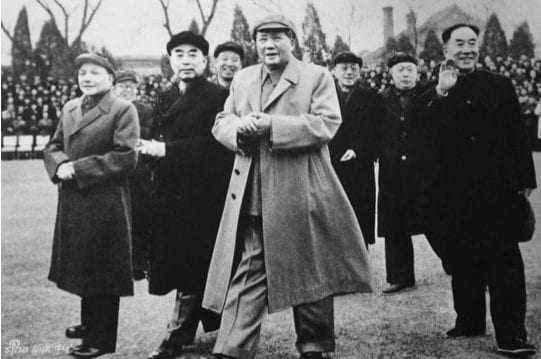 Far left is Deng Xiaoping; to right is Zhou Enlai and center stage is Mao Zedong. Many of Deng’s much ballyhooed socioeconomic reforms were actually begun by these three titans of Chinese communism, starting in the 1960s. (Image by baidu.com) 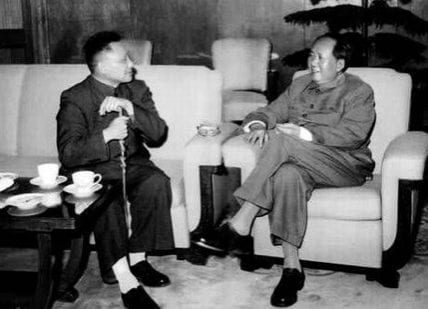 One of the greatest head fakes in geopolitical history: Deng Xiaoping giving eager Western capitalists the impression that China’s economic reforms would mean selling off state owned assets, preferably at fire sale prices. Pictured here is Deng on the left, absorbing Mao Zedong Thought from New China’s founder, the Chairman himself. (Image by baidu.com)
China’s amazing socio-economic success story during the Mao Era has been completely expunged behind the Great Western Firewall. https://www.greanvillepost.com/2015/06/16/radio-sinoland-mao-zedong-ow-or-wow-2015-5-1/ For Western colonialism, it must not become common currency that a once poor, technologically repressed country of China’s size, any size for that matter (think Cuba or Eritrea), can succeed economically and socially, under the banner of socialism and communism. It is for this reason that there is a relentless foghorn of Western propaganda to discredit any and all gains made by non-capitalist countries. The West’s owners surely don’t want free thinking people and their leaders in Africa, the Americas and Asia to get any radical ideas.
"Beijing is going in the opposite direction of Western colonialism, by rolling out a massive, nationwide social security and retirement program for anyone living here, even foreigners, if they pay payroll taxes...
These imperial lies have continued into the Deng Era. China is still a communist and socialist country. Baba Beijing has simply used the West’s methods, markets, investment and technology to continue to advance the wellbeing of China’s people, within its non-capitalist economy. This is hard for most Westerners to wrap their heads around, that China has been and continues to be a communist and socialist country, till now, 2015, and will continue to be so as long as Baba Beijing is in power. This explains why the West has been relentlessly trying to overthrow the Communist Party of China (CPC), since liberation in 1949.
Like the United States, Russia and France, the People’s Republic of China was founded and hewn from revolution. China’s long history and vision for the future are clearly spelled out in its constitution. The most recent version is from 1982, when Deng Xiaoping was China’s paramount leader. Here is an excerpt from the constitution’s preamble, http://en.people.cn/constitution/constitution.html
After the founding of the People's Republic, the transition of Chinese society from a new- democratic [Editor’s note: China’s first republican period, with Sun Yat-Sen, 1912-1949] to a socialist society was effected step by step. The socialist transformation of the private ownership of the means of production was completed, the system of exploitation of man by man eliminated and the socialist system established. The people's democratic dictatorship led by the working class and based on the alliance of workers and peasants, which is in essence the dictatorship of the proletariat, has been consolidated and developed. The Chinese people and the Chinese People's Liberation Army have thwarted aggression, sabotage and armed provocations by imperialists and hegemonists, safeguarded China's national independence and security and strengthened its national defense. Major successes have been achieved in economic development. An independent and fairly comprehensive socialist system of industry has in the main been established. There has been a marked increase in agricultural production. Significant progress has been made in educational, scientific, cultural and other undertakings, and socialist ideological education has yielded noteworthy results. The living standards of the people have improved considerably. Both the victory of China's new-democratic revolution and the successes of its socialist cause have been achieved by the Chinese people of all nationalities under the leadership of the Communist Party of China and the guidance of Marxism-Leninism and Mao Zedong Thought, and by upholding truth, correcting errors and overcoming numerous difficulties and hardships.
The basic task of the nation in the years to come is to concentrate its effort on socialist modernization. Under the leadership of the Communist Party of China and the guidance of Marxism- Leninism and Mao Zedong Thought, the Chinese people of all nationalities will continue to adhere to the people's democratic dictatorship and follow the socialist road, steadily improve socialist institutions, develop socialist democracy, improve the socialist legal system and work hard and self-reliantly to modernize industry, agriculture, national defense and science and technology step by step to turn China into a socialist country with a high level of culture and democracy. The exploiting classes as such have been eliminated in our country. However, class struggle will continue to exist within certain limits for a long time to come. The Chinese people must fight against those forces and elements, both at home and abroad, that are hostile to China's socialist system and try to undermine it.
 One of China's fast trains. The nation's infrastructure is being rapidly modernized, while in most of the West, especially in America, the ruling private sector neglects public works and investments that benefit the masses. China’s constitution clearly states that the Chinese people will govern themselves via their people’s democratic dictatorship. This dictatorship will guarantee the integrity of the People's Republic of China as a socialist state. This simply means that China’s citizens invest in the CPC to represent them and act on their behalf. Among the Chinese, this faith in their central government to do the right thing, and protect the citizens, their livelihoods and the country’s borders, is called the Heavenly Mandate. The Heavenly Mandate is a unique, sociopolitical concept that includes all previous emperors and dynasties, going back 5,000 years. The Heavenly Mandate stipulates that if the current Baba Beijing does not take care of the people’s business, it will be replaced with a new one.
The other key philosophy stated in China’s constitution is that the CPC is authorized to use dictatorial powers to vanquish any anti-revolutionary imperialists and hegemonists (Westerners) and fight the exploiting classes (meaning capitalists), both inside China (fifth column compradors) and outside China (Western empire), who are all trying to overthrow the CPC (via Western international institutions, NGOs and internal and external psyops/blackops subversion).
This unique, overriding sociopolitical, communist-socialist mandate is still true today, in spite of the Deng Era reforms. There is widespread, willful propaganda behind the Great Western Firewall to deny this anti-capitalist reality. Deng was a wily, masterful politician and charmer, and his diminutive body size disarmed his Western opponents, making them feel over-confident. He told them exactly what they wanted to hear and the Western empire began sharpening its knives, waiting to carve up and exploit China, just like it did for 110 years, from the 1840s’ Opium Wars until liberation in 1949. This period is known to the Chinese as the century of humiliation. But the real truth of Baba Beijing’s intentions was expressed by Deng, in 1982 that,
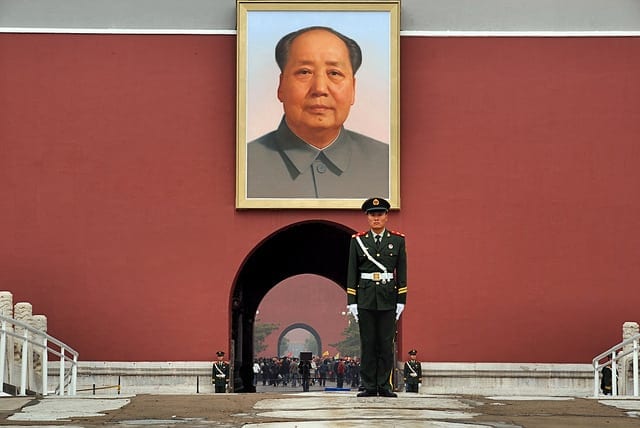 Mao's image still presiding on Tiananmen (Gate of Heavenly Peace) Chairman Mao did very good things. Many times he saved the Party and the state from crisis. Without him the Chinese people would, at the very least, have spent much more time groping in the dark. Chairman Mao’s greatest contribution was that he applied the principles of Marxism-Leninism to the concrete practice of the Chinese revolution, pointing the way to victory. It should be said that before the sixties or the late fifties many of his ideas brought us victories, and the fundamental principles he advanced were quite correct. He creatively applied Marxism-Leninism to every aspect of the Chinese revolution, and he had creative views on philosophy, political science, military science, literature and art, and so on… We won great victories for the revolution precisely because we adhered to Mao Zedong Thought… We will reaffirm that his contributions are primary and his mistakes secondary. We will adopt a realistic approach towards the mistakes he made late in life. We will continue to adhere to Mao Zedong Thought, which represents the correct part of Chairman Mao’s life. Not only did Mao Zedong Thought lead us to victory in the revolution in the past; it is — and will continue to be — a treasured possession of the Chinese Communist Party and of our country. That is why we will forever keep Chairman Mao’s portrait on Tiananmen Gate as a symbol of our country, and we will always remember him as a founder of our Party and state. Moreover, we will adhere to Mao Zedong Thought. We will not do to Chairman Mao what Khrushchev did to Stalin.
Best as I can tell, there is not much market-oriented liberalism to tease out of Deng’s statement.
The world has now entered China’s third great modern era, President Xi Jinping’s, starting in 2013. Xi did not get a PhD in Marxism-Leninism, upon which is based on Mao Zedong Thought, for nothing. He is mobilizing China’s people with his highly popular Chinese Dream, to achieve a moderately prosperous, socialist society, thereby rejecting mindless consumption. This is the antithesis of America’s gluttonous, greedy, self-centered me-ism.
The Chinese Dream also fully encompasses the goal of living in a clean and safe environment. Xi knows that all these capitalist adoptions in China have badly degraded the air, soil and water, as well as making it the world’s poster child for unsafe work conditions, as the Tianjin port explosion and numerous mining accidents can attest. Poll after poll shows that the people’s democratic dictatorship is clamoring for Green, Clean and Safe. If Baba Beijing does not address its citizens’ demands, it could quickly lose the Heavenly Mandate.
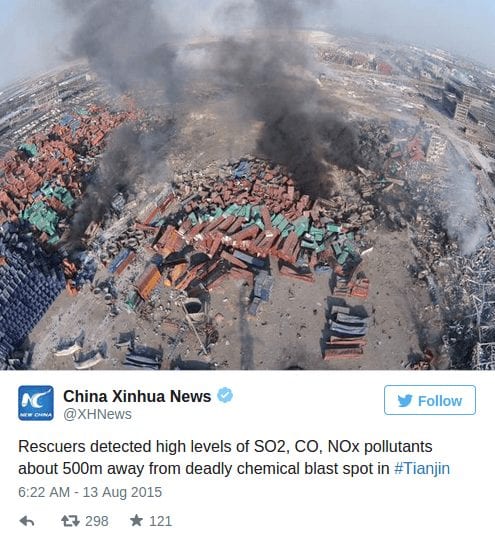
Baba Beijing will undoubtedly use the Tianjin port disaster as an administrative cudgel to push through more costly and stringent workplace safety legislation. The owners of the port storage company, Ruihai International Logistics, will surely face capital punishment or spend the rest of their lives behind bars. The fact that Ruihai is not a government owned company also gives Baba Beijing a powerful bully pulpit to tout the benefits of state owned enterprises, and they may use this tragedy to forcefully buy out privately held companies that are working in high risk fields.
A big sign that China is still communist-socialist is that Baba Beijing is going in the opposite direction of Western colonialism, by rolling out a massive, nationwide social security and retirement program for anyone living here, even foreigners, if they pay payroll taxes. This ambitious initiative also includes universal health care for everyone, especially children, the elderly and infirm. Meanwhile, the West is working furiously to dismantle its social and medical programs, or at the very least, making them much more expensive for its citizens, as well as looting many billions of dollars and euros from pension funds.
Xi Jinping and the CPC are also fully committed to bringing China’s 90 million poorest citizens out of extreme poverty, by 2030. This, while the West can’t defund and cancel fast enough what’s left of its sundered safety nets, for society’s most vulnerable. Xi is one of the world’s most powerful leaders. Yet, he regularly underscores this government mandate to the press and the people, even traveling to pockets of severe poverty, to drive home the point. The last US president who openly talked about poverty was Lyndon Johnson, and that was 50 years ago. As a country founded on communism and socialism, I’ve never heard a Chinese citizen complain about the less privileged taking what they should rightfully keep as “their own”. The idea that China’s worst off are economic leeches sucking off “hard working citizens” is unimaginable and repugnant here.
China is still very much communist, because every square meter of this country is owned collectively by the Chinese people, via the state. No one can buy the dirt under any piece of property. All one can do is have a long term lease, which by legislation, cannot exceed 70 years. For foreign businesses, this is quite acceptable, since there are very few capital investments, if any, that are not fully depreciated off the books in less than 50 years, most in 5-20 years.
Anybody on Planet Earth can invest in China’s real estate, but if you wish to keep it longer than 70 years, you will have to renew your lease contract and pay its going market value, to do so. This is what China’s constitution means that, “The socialist transformation of the private ownership of the means of production was completed”, meaning the entire country’s landmass was nationalized. Baba Beijing is continuing to try different ways of making the country’s land more productive, via creative laws and regulations, but it is still all collectively owned, every square millimeter.
The fact that China’s lands are collectively owned is suppressed behind the Great Western Firewall, because it is inconvenient that such an incredible, communist-socialist economic success story, is a proven fact. Only “private ownership” can assure the happiness and wellbeing of the people, or so goes the myth of Western capitalism, as peddled by Adam Smith and Francis Bacon. In reality, Smith and Bacon were only concerned with the prerogatives of the elite one percent.
China’s state sector, meaning government-owned businesses, dominates the national economy, and its presence is being felt, more and more, across our Pale Blue Dot. There are 155,000 state-owned enterprises (SOEs) in China, in every imaginable sector and industry. Their book value is US$17.4 trillion, more than America’s annual GDP. Since the 1990s, China has been and continues to adopt capitalist practices to make its SOEs perform better and be more transparent. A number of them are selling a portion of their ownership to the public, by listing shares on Chinese stock markets, keeping the vast majority of ownership in government hands, usually up to a 70% government-30% stock split. This sort of shareholder accountability has improved the performance of China’s SOEs, which is Baba Beijing’s goal.
Some of the bigger SOEs are splitting off sector-specific businesses and then selling minority stakes in them on the stock market, to allow these new entities to focus their specialized energies, compete on the national and world stage. Conversely, other SOEs are being consolidated to become planet conquering giants, in the energy, commodities, transportation, infrastructure and communication sectors. Thirdly, SOEs are spending billions of dollars and euros all over the world, buying outright or investing in stock traded companies, to add to their bottom line, ironically now making them government-owned under the SOE rubric.
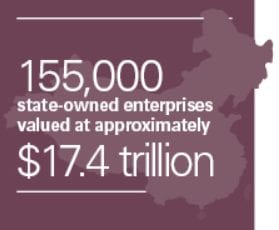 China’s people’s democratic dictatorship owns US$17.4 trillion in assets, more than the United States’ annual GDP. Not being able to plunder and pillage all these resources causes Western capitalists and the political leaders they own, to foam at the mouth with covetous rage. Image by baidu.com) The bigger they are, the more profitable they tend to be. On the capitalist sacred list, Fortune’s Global 500 Companies, http://fortune.com/global500/ China’s socialist behemoths are more and more competing head to head with the West’s most successful, stockholder corporations. In 2000, China only had 10 companies listed on this capitalist Holy Grail. By 2010, the count was up to 46 and this year, 99. Only 22 of these nearly 100 Chinese companies are majority shareholder owned. All the others are proudly flying the flag of China’s people’s democratic dictatorship.
How profitable are China’s government owned corporations? Last year, China’s 12 biggest SOEs on the Global 500 list made a combined total profit of US$201 billion. http://fortune.com/2015/07/22/china-global-500-government-owned/ China’s democratic dictatorship owns the world’s largest petroleum company (SINOPEC- bigger than ExxonMobil, BP and Shell), the largest bank (ICBC- bigger than Citibank, HSBC and Bank of America), the largest utility business (State Grid- bigger than E.On and Eléctricité de France), the largest construction engineering firm (China State Construction Engineering- bigger than Bechtel and KBR), the largest railroad business (China Railway Engineering), the third largest telecomm outfit (China Telecommunications), the sixth biggest insurance group (China Life Insurance) and the tenth largest automobile manufacturer (SAIC). The Chinese people own four of the world’s Top Ten banks and two of the five largest petroleum concerns.
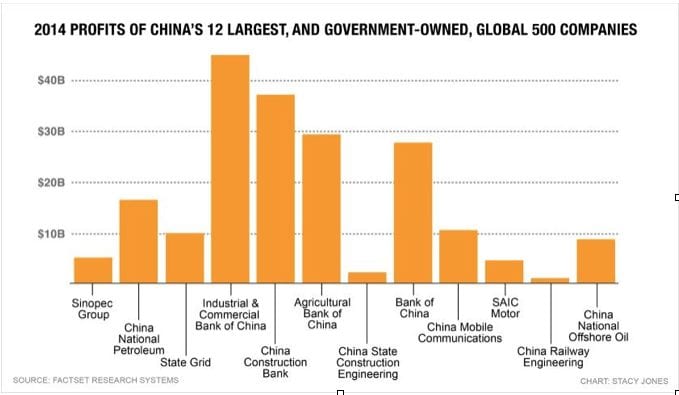 In 2014, US$201 billion in profits came from China’s 12 biggest state owned enterprises. China’s communist-socialist economic model scares the hell out of Western empire, since it offers an attractive and successful alternative to the West’s 1%-99% capitalist system of colonial exploitation and resource extraction. (Image by FRS) The largest of these publicly owned SOEs are managed by the world’s wealthiest sovereign asset organization, China’s State Assets Supervision and Administration Commission (SASAC). SASAC answers directly to the highest levels in Baba Beijing’s hierarchy, the State Council, which is headed by China’s Premier, Li Keqiang (#2, behind Xi Jinping). He is imminently qualified, having earned a law degree and a PhD in economics. SASAC keeps tabs on what are considered strategic sectors, which include aerospace, airlines, aluminum, architecture & design, automotive, aviation, banking, chemicals, coal, cotton, electronics, engineering, forestry, heavy equipment, gold, grain, heavy machinery, intelligence services, iron, materials, metallurgy, mining, non-ferrous metals, nuclear energy, ocean shipping, oil, pharmaceuticals, postal services, rail, salt, science and technology research, ship building, silk, steel, telecoms, travel and utilities. Most of these sectors are state monopolies or nearly so. http://www.sasac.gov.cn/
Other sectors that are state monopolies or dominated by SOEs are airports, arms and weapons, banks, dams/hydroelectricity, insurance, ports, tobacco, solar and wind power and toll roads and bridges.
 The economic model that the West cannot bring itself to admit is truly succeeding. The hen on the left is state owned assets. China’s SOEs are represented by a successful boy, who is handing state income eggs to the country and its commonwealth: the people’s democratic dictatorship. (Image by cnsphoto.com). The Western empire’s utter denial and arrogance towards China’s communist-socialist economic model were embarrassingly revealed recently, by a World Bank China Assessment report. In it, a couple of graphs were presented, showing that China’s FIRE sectors (finance-insurance-real estate) are essentially state monopolies. This admonition was termed as an insulting threat to Baba Beijing, as if China’s leaders and people don’t know what’s best for them. It stated that if China does not reform its financial sector, whose Western definition means selling off all state owned FIRE assets to the West, then trouble could lie ahead. It also derisively commented that all this state control is “making [China] an outlier by international standards”. http://finance.ninemsn.com.au/newsbusiness/aap/9004661/world-bank-retracts-part-of-china-report
Well, I should hope so, because China’s economy is communist-socialist, and not at all capitalist. This World Bank gaff of conceit was extirpated from the report a couple of weeks later, with the lame excuse that it had not been “adequately reviewed” before publication. The fact of the matter is, this was a classic Freudian slip, which accurately mirrors Western Empire’s true fears. Why? Because China’s economic performance has, since 1949, beaten the pants off of “unfettered, free market” America - by a long shot - and China’s superior communist-socialist model will increasingly outpace Western colonialism, as it slowly collapses into irrelevance.
This is what truly frightens Western colonialism to the quick. With the advent of China’s communism-socialism rising up as an alternative to the West’s 1%-99% system of exploitation and resource extraction, imperial propaganda has been relentless in brainwashing its citizens, to deny this model’s existence and discredit its many successful examples around the world.
Instead of America and the West being looked up to and admired as the model to adopt, China is rapidly taking center stage, to offer the world a different vision: revolutionary red communism-socialism. In fact, it is already happening. SOEs are popping up all across the world economy. In 2014, 23% of the Global 500 companies were SOEs, compared to only nine percent in 2005. This trend should continue into the 21st century, since China has shown that its economic model is clearly superior to Western colonialism. If Baba Beijing can bring the Chinese Dream to full fruition, by the stated goal of Year 2050, humanity just might have a chance to survive after all.
The next time someone starts regurgitating Randian, Chicago School, jungle capitalism tripe, hit back with the facts in this article and share its link We owe it to future generatons to bring down the Great Western Firewall and speak truth to power.
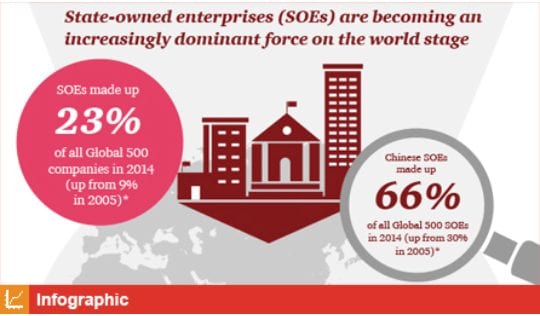 Going into the 21st century, the West’s colonial-imperial economic model is going to be seriously challenged by China’s model of communist-socialist state-owned enterprises (SOEs). (Image by infographic.com)
JEFF J. BROWN, Special Correspondent, Beijing
 Jeff J. Brown is the author of “44 Days Backpacking in China: The Middle Kingdom in the 21st Century, with the United States, Europe and the Fate of the World in Its Looking Glass” (2013), “Reflections in Sinoland – Musings and Anecdotes from the Belly of the New Century Beast” (2015), and “Doctor WriteRead’s Treasure Trove to Great English” (2015). He is currently writing an historical fiction, “Red Letters – The Diaries of Xi Jinping”, due out in 2016. He is a member of The Anthill, a collective of authors who write about China. Apart from his columns to The Greanville Post, he also submits articles on Oped News and Firedog Lake. His articles have been published by Paul Craig Roberts, The Saker, Ron Unz, Alternative News Network, Russophile, 15 Minute News, The Daily Coin, Hidden Harmonies and many other websites. He has been a guest on Press TV. Jeff J. Brown is the author of “44 Days Backpacking in China: The Middle Kingdom in the 21st Century, with the United States, Europe and the Fate of the World in Its Looking Glass” (2013), “Reflections in Sinoland – Musings and Anecdotes from the Belly of the New Century Beast” (2015), and “Doctor WriteRead’s Treasure Trove to Great English” (2015). He is currently writing an historical fiction, “Red Letters – The Diaries of Xi Jinping”, due out in 2016. He is a member of The Anthill, a collective of authors who write about China. Apart from his columns to The Greanville Post, he also submits articles on Oped News and Firedog Lake. His articles have been published by Paul Craig Roberts, The Saker, Ron Unz, Alternative News Network, Russophile, 15 Minute News, The Daily Coin, Hidden Harmonies and many other websites. He has been a guest on Press TV.
DEAR FRIENDS: Help us amplify the reach of our dispatches from Beijing by the uniquely qualified Jeff Brown. Be sure to share this article with friends, co-workers and kin, and note the following venues which are also carrying the reports:
44 Days Radio Sinoland on Sound Cloud: https://soundcloud.com/44-days
44 Days Radio Sinoland on Stitcher Radio: http://www.stitcher.com/podcast/44-days-publishing-jeff-j-brown/radio-sinoland?refid=stpr
44 Days Radio Sinoland on iTunes: https://itunes.apple.com/cn/podcast/44-days-radio-sinoland/id1018764065?l=en
REPOSTERS NEEDED. APPLY HERE!
Get back at the lying, criminal mainstream media and its masters by reposting the truth about world events. If you like what you read on The Greanville Post help us extend its circulation by reposting this or any other article on a Facebook page or group page you belong to. Send a mail to Margo Stiles, letting her know what pages or sites you intend to cover. We MUST rely on each other to get the word out!
And remember: All captions and pullquotes are furnished by the editors, NOT the author(s).



Spoiler title
 THIS IS A REPOST • FIRST PUBLISHED NOV 10, 2013 THIS IS A REPOST • FIRST PUBLISHED NOV 10, 2013

Lacking a central organizing idea and concrete vision of where they wanted to go, spontaneous movements like Occupy were too hobbled by anarchist nonsense to achieve much more than to sell a few more copies of Z Magazine and to create a decent phrase about the 1% making off with all the wealth at the expense of the 99%.
Not too many years ago, when protesters were running riot through the streets, disrupting meetings of the WTO, G7, and other international organizations, the Canadian newspaper The National Post served up a flattering and generous portrait of young people who had eschewed the streets as a terrain for political struggle and turned instead to what the newspaper considered the responsible and laudatory path of seeking nomination to run as candidates for the mildly social democratic (but in the newspaper’s view, rabidly leftwing) New Democratic Party.
This was a curious turn of events, for the National Post, a newspaper founded by the notoriously rightwing, white-collar criminal, Lord Conrad Black, was as likely in normal times to heap praise on anyone associated with the NDP as George Bush was to sing the praises of Kim Il Sung. But these were not normal times. In retrospect it’s easy to see that the protests, demonstrations, and strikes of the time, would fizzle and die, as the Occupy movement would also fizzle and die years later. Lacking a central organizing idea and concrete vision of where they wanted to go, they were too hobbled by anarchist nonsense to achieve much more than to sell a few more copies of Z Magazine and to create a decent phrase about the 1% making off with all the wealth at the expense of the 99%. But it was clear that the editors of the National Post were worried enough to recommend a path other than the streets to those who burned with the desire for political change. That they should recommend electoral politics was predictable. Young people who plowed their energies into the NDP would soon get bogged down in the harmless, ineffectual, routines of political campaigns, and be kept safely off the streets.
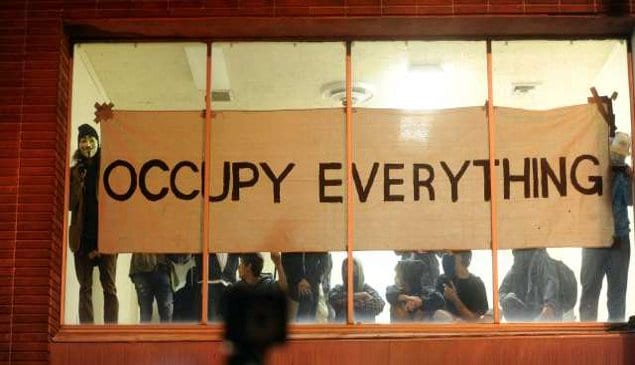 The wealthy are keen on electoral politics—when they go their way, as they often do. Elections in capitalist society can be dominated by money, as can the larger political process. Banks, corporations and major investors lobby politicians, fund political campaigns, bribe legislators with the promise of lucrative post-political jobs, place their representatives in key positions in the state, and shape the ideological environment through their control of the media, creation of think-tanks, hiring of PR firms, and funding of university chairs. Those without wealth can hardly compete, except, in principle, by pooling their resources and hoping to tilt the balance the other way against a formidable foe that controls infinitely more resources. The absence of organization and class consciousness, however, routinely assures this doesn’t happen. Moreover, the electoral arena channels dissent into predictable, controllable paths, keeping it off the streets, where it might become unpredictable and therefore dangerous. Additionally, the sway that corporate, banking and investor groups exercise behind the scenes is masked by the egalitarian spectacle of elections. One person, one vote. What could be more equal? The wealthy are keen on electoral politics—when they go their way, as they often do. Elections in capitalist society can be dominated by money, as can the larger political process. Banks, corporations and major investors lobby politicians, fund political campaigns, bribe legislators with the promise of lucrative post-political jobs, place their representatives in key positions in the state, and shape the ideological environment through their control of the media, creation of think-tanks, hiring of PR firms, and funding of university chairs. Those without wealth can hardly compete, except, in principle, by pooling their resources and hoping to tilt the balance the other way against a formidable foe that controls infinitely more resources. The absence of organization and class consciousness, however, routinely assures this doesn’t happen. Moreover, the electoral arena channels dissent into predictable, controllable paths, keeping it off the streets, where it might become unpredictable and therefore dangerous. Additionally, the sway that corporate, banking and investor groups exercise behind the scenes is masked by the egalitarian spectacle of elections. One person, one vote. What could be more equal?
I was reminded of this after reading the Russell Brand-edited issue of The New Statesman [1], not because it was in any particular way an endorsement of capitalist democracy, but because, like the National Post, it defined legitimate political change within parameters favorable to the established order. Of course, Brand wasn’t advocating electoral politics as the National Post was. On the contrary, he spoke out against voting in an interview with the BBC’s Jeremy Paxman, and called for a revolution. But Brand’s New Statesman went further than the National Post. Where the National Post said that those who fight for political change within the established system are admirable, while those who step outside it are not, Brand, as editor, tackled the larger idea of revolution (the only way, he said, he could get interested in politics. ) Mind you, a mass-circulation magazine was not about to become a platform to rally the masses to armed insurrection to overthrow the established order. “The revolution,” observed Gil Scott-Heron, “will not be televised.” Nor will it be found in the pages of the New Statesman. Predictably, the outcome of Brand’s editing exercise was the redefining of the entire idea of revolution, or, I should say, the destroying of it altogether, turning it into something vague and difficult to put your finger on, except to say it was good, and true, and safe to bring home to mother. But not at all like what Lenin, Stalin, Mao and Kim Il sung were implicated in. According to the luminaries Brand assembled to hold forth on what revolution means, revolution isn’t the transfer of productive property from one group to another –from, say, private owners to workers, or colonial settlers to those they dispossessed, or even owners who reside outside a country to the people within. Instead, it means many things, but not what you thought it did. [2]
 In Brand’s issue of The New Statesman, film-maker Judd Apatow writes that revolution is telling authority figures to fuck off…in a funny way. “Comedy itself is revolutionary,” he says, whatever that means. Deepak Chopra rejects politics altogether as “irrelevant” and writes that he puts his “trust in inner revolution,” as priests and other religious figures have done for centuries, counselling the exploited to look inward rather than outward, leaving the exploiters to carry on exploiting free from the inconvenience of anyone fighting back. Comedian Francesca Martinez seeks, not a revolution in who owns productive property, but “of our ideas.” Author Howard Marks begins on a promising note, writing that he would like to see a revolution along the lines of the “Marxist notions of transferring power from reactionary to progressive classes,” but quickly plunges into the ridiculous by expressing the hope that such a revolution will create an immediate utopia, where we can all smoke dope, love each other, and never fight. The model he would like to see realized on a grand scale is the “wine-drinking, dancing, pagan society without a written language” of the Kalash Valleys in northern Pakistan. “There are no prisons, no laws, no police and no vested interests.” Tim Street, director of UK Uncut Legal Action calls “democracy” the most revolutionary idea, and offers a vision of revolution in which the corporate ruling class remains in place (hence, no revolution at all), but where the people try to hold it in check. Street writes, “we can begin by holding corporations which put profit before people to account and fight back when they bully and threaten us. We can begin by using our voices and our bodies to protest, to take direct action against the cuts and tax dodging.” How depressingly far the idea of revolution has drifted (or has been pushed) from its moorings, when anti-capitalist revolution once meant abolition of the profit system, not pressuring corporations to put people before profits (a Quixotic project, since it is both legally and systemically impossible for capitalism to put people before profits. Street has set a rather ambitious goal for himself if he thinks he’s going to hold all the corporations that put profits before people (i.e., all of them) to account. He’ll hardly have time to keep abreast of the latest Noam Chomsky interviews on YouTube.) Newspaper owner Evgeny Lebedev offers nothing better, but at least knows what a revolution is, pointing to the American, French and Russian revolutions as revolutions. But Lebedev’s view of these revolutions is precisely what you might expect of a business owner. The American Revolution, he says, was “mostly very good”. The French is to be applauded, in part. But the Bolshevik revolution had no redeeming features whatever, expect this: It showed “that Marx’s method was incompatible with freedom and dignity.” Lebedev endorses “evolution” as “the better guide to human affairs” (now that the bourgeois revolutions have succeeded.) [3] In Brand’s issue of The New Statesman, film-maker Judd Apatow writes that revolution is telling authority figures to fuck off…in a funny way. “Comedy itself is revolutionary,” he says, whatever that means. Deepak Chopra rejects politics altogether as “irrelevant” and writes that he puts his “trust in inner revolution,” as priests and other religious figures have done for centuries, counselling the exploited to look inward rather than outward, leaving the exploiters to carry on exploiting free from the inconvenience of anyone fighting back. Comedian Francesca Martinez seeks, not a revolution in who owns productive property, but “of our ideas.” Author Howard Marks begins on a promising note, writing that he would like to see a revolution along the lines of the “Marxist notions of transferring power from reactionary to progressive classes,” but quickly plunges into the ridiculous by expressing the hope that such a revolution will create an immediate utopia, where we can all smoke dope, love each other, and never fight. The model he would like to see realized on a grand scale is the “wine-drinking, dancing, pagan society without a written language” of the Kalash Valleys in northern Pakistan. “There are no prisons, no laws, no police and no vested interests.” Tim Street, director of UK Uncut Legal Action calls “democracy” the most revolutionary idea, and offers a vision of revolution in which the corporate ruling class remains in place (hence, no revolution at all), but where the people try to hold it in check. Street writes, “we can begin by holding corporations which put profit before people to account and fight back when they bully and threaten us. We can begin by using our voices and our bodies to protest, to take direct action against the cuts and tax dodging.” How depressingly far the idea of revolution has drifted (or has been pushed) from its moorings, when anti-capitalist revolution once meant abolition of the profit system, not pressuring corporations to put people before profits (a Quixotic project, since it is both legally and systemically impossible for capitalism to put people before profits. Street has set a rather ambitious goal for himself if he thinks he’s going to hold all the corporations that put profits before people (i.e., all of them) to account. He’ll hardly have time to keep abreast of the latest Noam Chomsky interviews on YouTube.) Newspaper owner Evgeny Lebedev offers nothing better, but at least knows what a revolution is, pointing to the American, French and Russian revolutions as revolutions. But Lebedev’s view of these revolutions is precisely what you might expect of a business owner. The American Revolution, he says, was “mostly very good”. The French is to be applauded, in part. But the Bolshevik revolution had no redeeming features whatever, expect this: It showed “that Marx’s method was incompatible with freedom and dignity.” Lebedev endorses “evolution” as “the better guide to human affairs” (now that the bourgeois revolutions have succeeded.) [3]
 Oliver Stone and Peter Kuznick, authors of The Untold History of the United States, offer a 1960s New Left anarchist vision, where the only good revolutions are the ones that never happened and the bad ones are the ones that did. This meshes well with a brief entry by anarchist Noam Chomsky on how utopia can be brought about (about which more in a moment.) Stone and Kuznick find inspiration in former US Vice President Henry Wallace’s idea of a worldwide people’s revolution, which would “end militarism, imperialism and economic exploitation, redistribute wealth on a global scale, and spread the fruits of science and industry.” Great, but there are two problems here. For Stone and Kuznick, who, by the way, make no apologies for engaging in utopian (i.e., unrealistic) thinking, revolution is the answer to an intellectual problem: how to eliminate militarism, imperialism, and exploitation, which they regard as morally insupportable. But revolutions don’t work that way. People don’t overturn an existing political and economic order because they dislike militarism intellectually or regard exploitation as morally indefensible. They overturn existing orders when the conditions of their lives become intolerable, and revolution becomes the only way out—which is more likely to happen in the countries which are the victims of militarism and imperialism than in the ones which are the perpetrators and within whose borders lie the audience Stone’s and Kuznick’s comments are presumably directed at. Secondly, the duo seems to want to arrive at utopia without violence, conflict, hierarchy or power politics—in other words, a utopian path to utopia, where a utopia must first exist before it can be realized. We “have too often seen the use of violence unleash emotions and forces that beget more violence and new forms of tyranny and oppression,” they write. [4] Oliver Stone and Peter Kuznick, authors of The Untold History of the United States, offer a 1960s New Left anarchist vision, where the only good revolutions are the ones that never happened and the bad ones are the ones that did. This meshes well with a brief entry by anarchist Noam Chomsky on how utopia can be brought about (about which more in a moment.) Stone and Kuznick find inspiration in former US Vice President Henry Wallace’s idea of a worldwide people’s revolution, which would “end militarism, imperialism and economic exploitation, redistribute wealth on a global scale, and spread the fruits of science and industry.” Great, but there are two problems here. For Stone and Kuznick, who, by the way, make no apologies for engaging in utopian (i.e., unrealistic) thinking, revolution is the answer to an intellectual problem: how to eliminate militarism, imperialism, and exploitation, which they regard as morally insupportable. But revolutions don’t work that way. People don’t overturn an existing political and economic order because they dislike militarism intellectually or regard exploitation as morally indefensible. They overturn existing orders when the conditions of their lives become intolerable, and revolution becomes the only way out—which is more likely to happen in the countries which are the victims of militarism and imperialism than in the ones which are the perpetrators and within whose borders lie the audience Stone’s and Kuznick’s comments are presumably directed at. Secondly, the duo seems to want to arrive at utopia without violence, conflict, hierarchy or power politics—in other words, a utopian path to utopia, where a utopia must first exist before it can be realized. We “have too often seen the use of violence unleash emotions and forces that beget more violence and new forms of tyranny and oppression,” they write. [4]
It was the New Left’s desire for the ocean without the roar of the river that led to the movement’s denunciation by its critics as comprising those who “combine the luxury of being eternally in the right without the obligation of ever actually being responsible for anything.” And indeed, the New Left, and its successors, managed to escape responsibility by never actually achieving anything that would require that they bear it. Arnold Kettle noted in 1960, that “What the New Left seems not to be able to stomach is that (the countries that actually had revolutions) should have not only principles but also a strategy, a diplomacy, a defense policy…and all the responsibilities and consequent impurities… Power politics is always used by New Left writers in a derogatory sense, as if there were some other form of politics.” As for the New Left vision of what a revolution was to achieve, “it was a reality beyond class struggle, a society which is neither capitalist nor socialist, but simply nice.” [5] Indeed, Stone and Kuznick express their vision in terms of a nice world of “creativity, kindness and generosity” where “greed and the lust for power” have no place, rather than a world of jobs for all, free heath care and education, cheap public transportation, subsidized housing, and affordable childcare, racial and gender equality, and investment of the social surplus into raising the living standards of all. If you want a nice world of kindness and charity where greed and lust for power have no place, there are plenty of religions around to take care of that. But that’s not revolution.
Stone and Kuznick reserve special scorn for” Stalin, Mao and the Kims”, who they depict as power-hungry defilers of “the noble concept of revolution” who grabbed power to aggrandize themselves. Fuck them, they write. One day someone will have to write The Untold History of 20th Century Revolutions to correct Stone’s and Kuznick’s defiling of accomplished revolutionaries. For now, suffice to say that the title of the duo’s book ought to be changed to The Untold History of the United States by Two Confused Leftists Who Have Yet to Be Told the Untold History of Russia, China and Korea.
For Stone’s and Kuznick’s benefit here’s a brief history to fill the gaps of their knowledge.
Kim
Kim Il Sung was an effective guerrilla leader who made an enormous contribution to the liberation of Korea from Japanese colonial rule, and from the form of residual rule by Japanese collaborators that took hold in the south, and has echoes today. South Korea’s current president, Park Geun-hye, is the daughter of the military dictator, Park Chung-hee, who served in the Japanese imperial army, hunting down Kim and his guerrillas. Whatever one might say about the de facto, but hardly de jure, Kim dynastic succession, the Kims trace their lineage to a leading anti-colonial guerrilla who played a lead role in building an independent state, free from domination by outside powers. The south, in contrast, is a neo-colony of the United States, where the armed forces are under the wartime command of the Pentagon, and anti-communist descendants of Japanese collaborators exercise local control. Had Kim anticipated Deepak Chopra’s path and declared politics “irrelevant” and put his “trust in inner revolution”, Oliver Stone and Peter Kuznick might have lauded him, rather than blurting “Fuck…the Kims.” Yet, the price of Kim’s earning the respect of the New Left film-makers would likely have been Korea remaining a colony of Japan, or more likely, a neo-colony of the United States from the south to the north.
Mao
Before the Mao-led revolution in China, 55 to 65 percent of the land was owned by 10 percent of the population, mainly landlords–parasites who exploited the labor of peasants by virtue of claiming ownership of the land and holding it by law and force. Hundreds of millions eked out bare existences on tiny plots and forever faced the threat of famine. The country had less industrial power than Belgium. Long dominated by outside powers, the Chinese lived as untermenschen in their own country. “Everything fed the revolution. Only by revolution could China’s peasants get land, get out from under landlord control…Without revolution, China would have remained in the grip of imperialism, a semi-colony, dominated and exploited by the United States.” [6] Domenico Losurdo points out that, “It is widely known that Mao Zedong declared at the foundation of the Peoples Republic of China that the Chinese nation had risen up and nobody would tread on it again. Perhaps he was thinking about the years when a sign at the entrance to the French consulate in Shanghai forbade entrance to Chinese and dogs.” Losurdo asks: “Is the new situation in the great Asian country a result of ‘failure’?” [7] To be sure, the Chinese Revolution falls well short of Stone’s and Kuznick’s vision of a world free from militarism, imperialism, and exploitation, and where creativity, kindness, and generosity have replaced greed and lust for power, but it did improve the lives of hundreds of millions. As the privileged son of a stockbroker who has lived his life in a country that dominates others, Stone may regard Mao’s revolution as a defiling of the noble concept of revolution, but he’d find few Chinese to agree with him.
Stalin
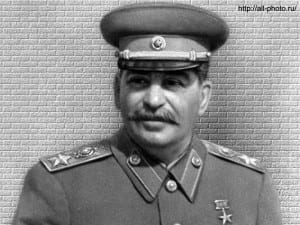 Stalin made enormous contributions to socialism, decolonization, and indirectly, to the emergence of the welfare state in the West. He played a lead role in the building of the first publicly-owned, planned, economy –one free from unemployment and the insecurities and injustices of the past. He was at the forefront of the project to lift Russia from backwardness, succeeding spectacularly in short order. His contributions to the defeat of fascism were unparalleled, exceeding those of any other individual. Under his leadership, the monarchies and military dictatorships of Eastern Europe were overthrown and, no, the socialist societies that replaced them were not simply new forms of oppression. Their economies grew rapidly and with them standards of living rose to unprecedented levels, while the insecurities, injustices, inequalities and exploitation of the past were eliminated. The national liberation movement had no greater friend than Stalin’s Soviet Union. By successfully creating an alternative to capitalism, Stalin forced Western governments to build robust programs of social welfare to maintain the allegiance of their populations. And the Soviet Union’s policy of racial equality embarrassed the United States into improving the conditions of its black citizens. Stalin made enormous contributions to socialism, decolonization, and indirectly, to the emergence of the welfare state in the West. He played a lead role in the building of the first publicly-owned, planned, economy –one free from unemployment and the insecurities and injustices of the past. He was at the forefront of the project to lift Russia from backwardness, succeeding spectacularly in short order. His contributions to the defeat of fascism were unparalleled, exceeding those of any other individual. Under his leadership, the monarchies and military dictatorships of Eastern Europe were overthrown and, no, the socialist societies that replaced them were not simply new forms of oppression. Their economies grew rapidly and with them standards of living rose to unprecedented levels, while the insecurities, injustices, inequalities and exploitation of the past were eliminated. The national liberation movement had no greater friend than Stalin’s Soviet Union. By successfully creating an alternative to capitalism, Stalin forced Western governments to build robust programs of social welfare to maintain the allegiance of their populations. And the Soviet Union’s policy of racial equality embarrassed the United States into improving the conditions of its black citizens.
It’s instructive to consider the Soviet Union in 1936. Soviet democracy, based on the constitution Stalin played a key role in writing, was being rolled out. The constitution mandated the creation of a system of elected representatives. Stalin was elected the representative of a Moscow constituency of the Supreme Soviet of the USSR. By this assembly he was elected as one of 30 members of the Presidium, which in turn elected a Council of Commissars. He did not call himself a dictator, nor was there a position of dictator to be occupied.
Soviet democracy has been derided and ridiculed in the West. But let’s consider the Soviet form of democracy in 1936 versus the Western form. At the time, Britain had an unelected House of Lords (still does), while Canada had, and continues to have, an unelected Senate. Of 500 million inhabitants of the British Empire, only 70 million, or 1/7th, lived in political democracies. South Africa denied suffrage to its black population. In Canada and Australia, aboriginal people were not allowed to vote. India had no political democracy at all, and was governed by the British civil service. The United States denied civil rights to its black citizens, who lived in a state of oppression. [8] In contrast, suffrage in the USSR was universal, hardly the tyranny by comparison with the West that Stone and Kuznick would have us believe it was.
As to the perennial charge that Stalin murdered millions, we can dismiss this as an unexamined legend that everyone believes to be true because someone (they just can’t remember who) told them it was, and about which they can provide no details, like who, how, when and why? William Blum writes:
“We’ve all heard the figures many times…10 million…20 million…40 million…60 million…died under Stalin. But what does the number mean, whichever number you choose? Of course many people died under Stalin, many people died under Roosevelt….Dying appears to be a natural phenomenon in every country. The question is how did those people die under Stalin? Did they die from the famines that plagued the USSR in the 1920s and 30s? Did the Bolsheviks deliberately create those famines? How? Why? More people certainly died in India in the 20th century from famines than in the Soviet Union, but no one accuses India of the mass murder of its own citizens. Did the millions die from disease in an age before antibiotics? In prison? From what causes? People die in prison in the United States on a regular basis. Were millions actually murdered in cold blood? If so, how? How many were criminals executed for non-political crimes? The logistics of murdering tens of millions of people is daunting.” [9]
The numbers are, in fact, estimates derived by comparing the Soviet population with projections of whatever the author making the estimate thinks the population would have been at a given point had Stalin never existed. The difference between the two figures is then said to represent the missing population, or people Stalin “murdered.” It’s obvious that this method is open to abuse and that attributing excess deaths to mass murder has no other intention than to bamboozle people into believing that Stalin ordered the cold-blooded killing of tens of millions. This isn’t to say that Stalin didn’t order executions, and lots of them. He did. But executions in times of exceptional circumstances, when the revolution was under threat from within and without—as the Soviet Union was throughout the Stalin era–are no less necessary than the killing of soldiers of an invading army. It was war. Unless action fitting to war was taken, the revolution would fail. Everywhere fifth columnists facilitated the Nazi invasions, except in the Soviet Union where there was no fifth column. Stalin had eliminated it. He may have uniquely accomplished this feat by accepting a high false-positive rate as the cost of extirpating the disease, catching the innocent and harmless in his net as well as the dangerous and guilty. But when it’s unclear whether the tissue is diseased or healthy, the surgeon who saves the patient cuts out both the clearly diseased and the surrounding suspicious (though possibly healthy) tissue. The question is: Did Stalin order executions to satisfy a personal lust for power, or to safeguard the revolution bequeathed by Lenin? Stalin’s political enemies have always favored the first explanation. And the CIA has ensured that those who favored it had a platform from which to spread it far and wide.
When Stalin came to power, the Soviet Union was in a precarious position—its agriculture backward, its industry stunted, its military feeble. What’s more, fierce and fissiparous debate within the Communist Party about the way forward had produced paralysis, infighting and intrigues. The country was going nowhere, fast. Three decades later Stalin was dead. But in those three decades, with Stalin at the helm, the country had advanced from the wooden plow to the atomic pile.
“When Stalin died in 1953, the Soviet Union was the second greatest industrial, scientific, and military power in the world and showed clear signs of moving to overtake the United States in all these areas. This was despite the devastating losses it suffered while defeating the fascist powers of Germany, Romania, Hungary and Bulgaria. The various peoples of the U.S.S.R were unified. Starvation and illiteracy were unknown throughout the country. Agriculture was completely collectivized and extremely productive. Preventive health care was the finest in the world, and medical treatment of exceptionally high quality was available free to all citizens. Education at all levels was free. More books were published in the U.S.S.R than in any other country. There was no unemployment.
“Meanwhile, in the rest of the world, not only had the main fascist powers of 1922-1945 been defeated, but the forces of revolution were on the rise everywhere. The Chinese Communist Party had just led one fourth of the world’s population to victory over foreign imperialism and domestic feudalism and capitalism. Half of Korea was socialist…In Vietnam, a strong socialist power, which had already defeated Japanese imperialism, was administering the final blows to the beaten army of the French empire. The monarchies and fascist dictatorships of Eastern Europe had been destroyed by a combination of partisan forces, led by local Communists, and the Soviet Army…The largest political party in both France and Italy was the Communist Party. The national liberation movement among the European colonies and neo-colonies was surging forward…The entire continent of Africa was stirring.” [10]
Were these the accomplishments of a “failed” revolution? Domenico Losurdo demands that critics like Stone and Kuznick,
“explain how a ‘failure’…has managed to make such an enormous contribution to the emancipation of the colonial people and, in the West, to the destruction of the old regime and the emergence of the welfare state. In 1923, when Lenin, gravely ill, is forced to release the reins of power, the state that emerged from the October Revolution, mutilated in the peace treaty of Brest-Litovsk, is leading a paltry and precarious life. In 1953, at Stalin’s death, the Soviet Union and the socialist camp are enjoying enormous growth, power, and prestige. A few more of these (‘defilers of the noble concept of revolution’) and the situation of the imperialist and capitalist world system would have become precarious and untenable indeed!” [11]
Contrary to Stone’s and Kuznick’s falsifications, Stalin did more to bring the world closer to their vision of freedom from militarism, imperialism and exploitation than anyone else. Yet the two Americans say “Fuck Stalin.” They don’t, however, say “Fuck Castro.” Why not? The Cuban revolution was guerrilla-led, like Mao’s and Kim’s, assisted by the Soviet Union, like Mao’s and Kim’s, and Cuban socialism is based largely on the “Stalinist” model. Yet, Stone, whose three documentaries on the Cuban revolutionary reveal a soft spot for Castro, doesn’t accuse the leader of the Cuban revolution of defiling the concept of revolution in the interests of power, self-aggrandizement, repression and iron-fisted control.
The inconsistencies don’t stop there. Stone, it seems, also has a soft spot for Barack Obama, who he reportedly voted for in 2008 and 2012. [12] Shouting “Fuck Stalin, Mao and the Kims” while voting for Obama calls to mind Michael Parenti’s criticism of the hypocrisy of left anti-communists who profess revulsion at the “crimes of communism” while facilitating the crimes of Democratic presidents by voting for them.
Parenti explains:
“Under one or another Democratic administration, 120,000 Japanese Americans were torn from their homes and livelihoods and thrown into detention camps; atomic bombs were dropped on Hiroshima and Nagasaki with an enormous loss of innocent life; the FBI was given authority to infiltrate political groups; the Smith Act was used to imprison leaders of the Trotskyist Socialist Workers Party and later on leaders of the Communist party for their political beliefs; detention camps were established to round up political dissidents in the event of a ‘national emergency’; during the late 1940s and 1950s, eight thousand federal workers were purged from government because of their political association and views, with thousands more in all walks of life witch-hunted out of their careers; the Neutrality Act was used to impose an embargo on the Spanish Republic in favor of Franco’s fascist legions; homicidal counterinsurgency programs were initiated in various Third World countries; and the Vietnam War was pursued and escalated. And for the better part of a century, the Congressional leadership of the Democratic party protected racial segregation and stymied all anti-lynching and fair employment bills. Yet all these crimes, bringing ruination and death to many, have not moved the liberals, the social democrats, and the ‘democratic socialist’ anticommunists to insist repeatedly that we issue blanket condemnation of either the Democratic party or the political system that produced it…” [13]
Stone and Kuznick may deplore these Democratic party crimes, but it’s unlikely they’d ever say “Fuck the Democrats.” It’s more likely they’d say, “Vote Democrat.” So, let’s forget about “Fuck Stalin, Mao and the Kims.” If Stone is really interested in ending militarism, imperialism, and exploitation, why isn’t he telling us to “Fuck Obama,” a major promoter of the scourges Stone says he hates, rather than running down historical figures who actually fought against imperialism and exploitation, and won?
The Stone and Kuznick view is, really, rather quite silly. They believe that Mao and Kim decided to become guerrillas, and Stalin, a Bolshevik, because these were routes to the acquisition of personal power, self-aggrandizement, and iron-fisted control. Yet, at the time, guerrilla and underground revolutionary were hardly the most promising career paths for people who lusted for power and self-aggrandizement. If Stalin really lusted after these things, why didn’t he link up with Tsarist forces, rather than the Bolsheviks, which until mid-1917 were a minor political force that no one (including many Bolsheviks) expected to take power? Chinese and Koreans who became guerrillas were more likely to find themselves dead, tortured or imprisoned, than rising to the head of a bureaucracy administering a new state. They became guerrillas because they found feudal and imperialist oppression intolerable and wanted to put an end to them. A Georgian like Stalin became a Bolshevik because he hated Tsarist oppression and wanted to replace it. Stalin lived much of his early life underground, trying to keep one step ahead of the Tsarist police, and serving long stretches in internal exile. As leader of the Soviet Union he lived a modest, almost Spartan life. He was not a Red Tsar, living in the lap of luxury, as Stone’s and Kuznick’s crude myth-making would have us believe. Stalin, Mao and Kim understood that ending oppression meant taking political power, which meant, in turn, a disciplined, organized approach to the project—one that involved leaders and hierarchy. The idea that the politically-inspired seek power for power’s sake is an anarchist confusion. As Richard Levins points out, even George W. Bush would never have promoted universal free health care, subsidized Venezuela, or renounced Jesus just to stay in power. Behind “every facade of power-hunger, there lurks a person of principles, though (as in Bush’s case) these may be noxious principles.” [14] Revolutionaries seek power to aggrandize the position of the class they represent. People in leadership positions may be in positions to exercise power, but that doesn’t mean they seek power as an end in itself. They seek power as an instrument to accomplish goals that comport with the aspirations of the class or people they represent. Stone’s and Kuznick’s cynicism tars the disciplined, organizational forms necessary for revolution. In their view, and that of anarchists generally, hierarchical, disciplined organizations are vehicles of tyranny and oppression that will inevitably be used by tyrants-in-embryo to catapult themselves to power, whereupon they will subvert the revolution’s beautiful goals to aggrandize themselves and exercise an iron-fisted control. Did Kim subvert the goal of achieving Korean independence? Did Mao not overturn centuries of feudalism and great power domination? Did Stalin fail to abolish unemployment, homelessness, national oppression, and racial inequality? The view that the leaders of successful revolutions betrayed the revolution’s goals to aggrandize themselves is not only bad history, it’s bad politics. It encourages people seeking political change to eschew any form of “Leninist” politics, in favor of “leaderless” agglomerations, which practice decentralized decision-making, and accomplish not much of anything.
Noam Chomsky is an endless source of slurs against Leninism, which he equates with “counterrevolution”, [15] a heterodox view of what revolution is, but certainly consistent with the Brand-edited New Statesman view that it’s something other than what you always thought it was, and what you always thought it was is actually quite a bad thing that should be avoided altogether. I suppose it should come as no surprise that Chomsky answers the question, “What does revolution mean to you?”, with an attack on Lenin, the leader of a revolution that succeeded, and praise for Rosa Luxemburg, a leader of an attempted socialist revolution that failed. Chomsky writes,
“I cannot improve on Rosa Luxemburg’s eloquent critique of Leninist doctrine: a true social revolution requires a ‘spiritual transformation in the masses degraded by centuries of bourgeois class rule…it is only by extirpating the habits of obedience and servility to the last root that the working class can acquire the understanding of a new form of discipline, self-discipline arising from free consent.’ And as part of this ‘spiritual transformation’, a true social revolution will, furthermore create—by the spontaneous activity of the mass of the population—the social forms that enable people to act as free creative individuals, with social bonds replacing social fetters, controlling their own destiny in freedom and solidarity.” [16]
Here’s A.J. Ryder, a historian of the German Revolution, on Luxemburg’s role in the failure to bring about a socialist revolution in Germany in 1918-1919.
“Spartacists (Karl) Liebknecht and Rosa Luxemburg…were conscious revolutionaries in deed as well as in word. They were bent on using the opportunity presented by the fall of the Hohenzollern regime to set in motion the socialist revolution which they believed would carry them to power in place of Ebert as Lenin had displaced Kerensky….Few (of the leaders) possessed the qualities of a successful revolutionary leader. By common consent Rosa Luxemburg was the outstanding personality of the left, but her intellectual gifts and personal fanaticism were not matched by a grasp of reality. She was at heart a romantic, a visionary appearing in the garb of ‘scientific socialism.’” [17]
Ryder sums up the failure of the revolution by reference to the failings of its key personalities. They “were amateurs compared with Lenin.” [18] Luxemburg, the romantic, emphasized spontaneity and ‘spiritual transformation.’ Lenin, the hard-headed realist, emphasized planning and organization. Luxemburg was murdered by proto-fascist thugs, her bloodied corpse tossed into a canal, as the revolution she sought to midwife, sputtered and failed. Lenin seized power to set in motion a socialist, anti-imperialist project that spanned over seven decades—one that played the key role in exterminating the fascism that, in its embryonic stage, murdered Luxemburg.
Chomsky has enormous respect for those who have failed at revolution, and enormous contempt for those who have succeeded. If we were to follow his lead and emulate the failures, while eschewing the successes, we would be sure to arrive at the same place the National Post wanted young political activists to arrive at: a political dead-end. Brand’s edition of the New Statesman follows in the same vein. Its positive statements are reserved for political action that leaves the established order in place: Chopra’s “internal revolution”; Apatow’s comedy; Lebedev’s evolution; Martinez’s new thinking; Tim Street’s “democracy.” Its negative statements are reserved for the revolutions that actually brought about the “revolutionary transformations of the deepest and most profound sort” that Stone and Kuznick say they want. So, the message is clear. Light a joint, work on your kindness and generosity, demand that corporations put people before profits, watch a Marx Brother’s movie*, and tell Lenin, Stalin, Mao and Kim to fuck off.
*I’ve watched every Marx Brothers' movie, many of them multiple times, but have yet to bring about a revolution."
ABOUT THE AUTHOR 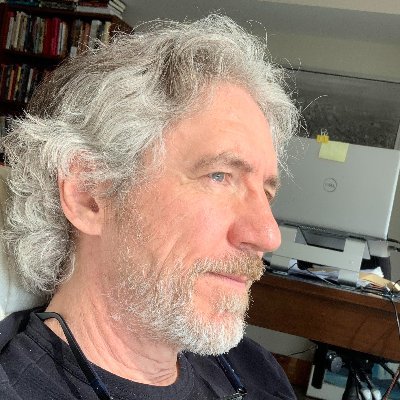 Stephen Gowans is an independent political analyst and author of two acclaimed books, Washington's Long War on Syria (2017) and Patriots, Traitors, and Empires: The Story of Korea's Struggle for Freedom (2018), both published by Baraka Books. Stephen Gowans is an independent political analyst and author of two acclaimed books, Washington's Long War on Syria (2017) and Patriots, Traitors, and Empires: The Story of Korea's Struggle for Freedom (2018), both published by Baraka Books.
Notes
1. New Statesman, October 24, 2013, http://www.newstatesman.com/Russell%20Brand
2. What Does Revolution Mean to You? The New Statesman, October 30, 2013, htt://www.newstatesman.com/2013/10/what-does-revolution-mean-you
3. Ibid.
4. Ibid.
5. Arnold Kettle, “How new is the ‘NewLeft’”, Marxism Today, October, 1960,http://www.unz.org/Pub/MarxismToday-1960oct-00302
6. Edward and Regula Boorstein. Counterrevolution: U.S. Foreign Policy. International Publishers. 1990. p. 73.
7. Domenico Losurdo, “History of the Communist Movement: Failure, Betrayal, or Learning Process?”, Nature, Society, and Thought, Vol. 16, no 1 (2003). http://homepages.spa.umn.edu/~marquit/nst161a.pdf
8. Sydney and Beatrice Webb. The Truth about Soviet Russia. Nabu Public Domain Reprints. pp. 21-22.
9. William Blum. Freeing the World to Death: Essays on the American Empire. Common Courage Press. 2005. p. 194.
10. Bruce Franklin, “An Introduction to Stalin,” excerpted from Bruce Franklin (Ed.). The Essential Stalin: Major Theoretical Writings, 1905-52 (Anchor Books, 1972). http://anti-imperialism.com/2012/11/02/an-introduction-to-stalin/
11. Losurdo.
12. Solvej Schou, “Oliver Stone on Obama: ‘I hope he wins’”, Entertainment Weekly, November 6, 2012.http://insidemovies.ew.com/2012/11/06/oliver-stone-obama-presidential-election/
14. Richard Levins, “How to Visit a Socialist Country”, Monthly Review, 2010, Volume 61, Issue 11, (April),http://monthlyreview.org/2010/04/01/how-to-visit-a-socialist-country
15. Parenti, pp. 46-47.
16. “What Does Revolution Mean to You?”
17. A.J. Ryder. The German Revolution of 1918: A Study of German Socialism in War and Revolt. Cambridge University Press. 2008. p. 7.
18. Ibid.
Please share this article as widely as you can.
 Soviet soldiers at Reichstag, May 1945.
A Special Column for The Greanville Post
(Annotated) • First posted on June 3, 2014
Steven Jonas, MD, MPH
Senior Editor
ANNOTATED BY PATRICE GREANVILLE
"Many critics of the Soviet Union conveniently forget that the Soviet experience was shaped in a significant part by what someday will come to be known as 'The 75 Years War Against the Soviet Union, 1917-1992.'"
 In the Western, capitalist, telling of history, “Stalin” and “Stalinism” almost invariably equal “socialism/communism, which, of course, equal ‘bad,’ ” and beyond that, it/they could never work. One experiment (forgetting about what happened in China, and perhaps with more relevance, Cuba) and that’s it. Socialism, communism, the old term “Bolshevism,” was tried and failed in the Soviet Union and boy, it just couldn’t possibly work anywhere, anyhow, at any time in the future. This is a view that is adhered to not only by capitalist historians and political scientists. It is also adhered to by many self-styled “left-wingers” in the West. Without naming names, these folks, when talking about left-wing analyses of what is currently happening in the capitalist world, due to capitalist causation, like climate change and the coming Sixth Extinction or on a less-grand scale the export of capital from the advanced capitalist countries and what that is doing to living standards for most of their working classes, always start with an self-exculpatory statement. In the Western, capitalist, telling of history, “Stalin” and “Stalinism” almost invariably equal “socialism/communism, which, of course, equal ‘bad,’ ” and beyond that, it/they could never work. One experiment (forgetting about what happened in China, and perhaps with more relevance, Cuba) and that’s it. Socialism, communism, the old term “Bolshevism,” was tried and failed in the Soviet Union and boy, it just couldn’t possibly work anywhere, anyhow, at any time in the future. This is a view that is adhered to not only by capitalist historians and political scientists. It is also adhered to by many self-styled “left-wingers” in the West. Without naming names, these folks, when talking about left-wing analyses of what is currently happening in the capitalist world, due to capitalist causation, like climate change and the coming Sixth Extinction or on a less-grand scale the export of capital from the advanced capitalist countries and what that is doing to living standards for most of their working classes, always start with an self-exculpatory statement.
The latter usually starts with something like: “of course ‘Stalinism’ [usually without defining what they mean by that term] was awful, the Soviet Union was a complete horror show, and we are definitely not talking about anything like that.” They often add that because of what happened over the next 75 years in the Soviet Union following the Bolshevik Revolution of 1917, carried out on Leninist principles, nothing like that sort of revolution could ever possibly succeed and, some of them say, must be opposed with as much fervor as that with which they claim to be opposing capitalism. Of course the capitalist analysts don’t have to engage in such exculpation, but use the same sort of analysis nevertheless.
For many years I have thought about what might have happened in the development of capitalism if, following the collapse of the Cromwellian Revolution in England and the Restoration of the Stuart Monarchy (1661, which brought us Restoration Comedy and all those cute dogs), both its critics and original supporters had said something like, “well, that’s it. It’s obvious that mercantile capitalism (which was the driving force behind the Cromwellians) cannot possibly work, feudalism is here to stay forever, and well, folks, just live with it.” Of course that didn't happen. In England next came the Glorious Revolution of 1688, the Stuarts were replaced by an imported King who favored Constitutional Monarchy, and indeed the doors were opened to the development through the 18th century of mercantile capitalism and then industrial capitalism in the 19th century.
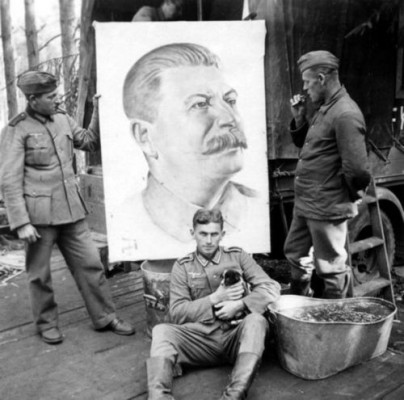 Unusual photo showing German soldiers in the USSR, in 1943, before a portrait of Stalin left behind by retreating Soviet troops. The eerie tranquility of the image is accentuated by the puppy. In my view, there is no reason why much the same sort of historical development could not take place for the replacement of capitalism with some sort of socialism that, without going into any detail here, learns much from both the positive and negative elements of the Soviet experience. In fact, if that doesn’t happen, our species is doomed to become a very different, much smaller, rather miserable one over the next century, taking many other species with us as we shrink in size and world-coverage, driven towards that end on a profits-first-and-only capitalism that refuses to do anything meaningful to deal with global warming.
________
One never hears “Hitler Equals Capitalism Equals Bad, and it could never work.”
One must also acknowledge (which Western analysts, neither capitalist nor self-styled “socialist” do) that the Soviet experience was shaped in a significant part by what someday will come to be known as “The 75 Years War Against the Soviet Union, 1917-1992.” One must also acknowledge, that every other attempt at some sort of socialist experiment following World War II (except for Cuba) was beaten back and eventually destroyed by Western Imperialism, most often led by the United States.
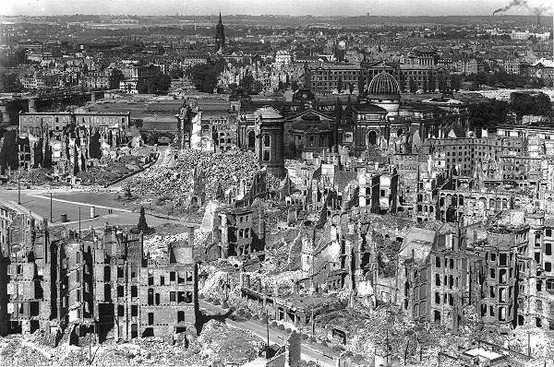 The wages of Nazism: Dresden utterly destroyed in an allied "terror bombing." Nazism and fascism, logical and inevitable offshoots of capitalism, are inseparable from the cult of nationalism and constant war. Nevertheless, we have the mantra “Stalin Equals Socialism/Communism, Bad, and nothing like it could ever possibly work.” But one never hears “Hitler Equals Capitalism Equals Bad, and it could never work.” Of course, the first reason for that is that there are other models for capitalism and its preservation/expansion than the Hitlerian one. (And so why could not one also say that there are other models for revolutionary/Leninist socialism which could work?) But more importantly, for both capitalist and non-Communist analysts of 20th century history, Hitlerism/Nazism/Fascism is almost never openly associated with capitalism as the driving force for its development. But indeed it, and it brother fascist states in Italy (the first major one [Hungary under Admiral Miklos Horthy preceded it] that gave the governmental form its name) and Japan, were created by capitalist ruling classes that no longer wanted to entrust their control of the economy and the state to the (bourgeois) “democratic process.”
 Hitler was a creature of the international bourgeoisie. Fascism is normally the Frankenstein invoked by the ruling capitalist classes when threatened by social upheavals. Even many nobles in Britain were openly sympathetic to his regime. In Germany, the Nazis came to power on January 30, 1933 because a significant element of the German ruling class had decided that they could no longer stay in control of the German state and economy if the prominent and powerful German Socialist and Communist Parties and the equally powerful German trade union movement stayed in existence. The Communist Party was outlawed almost immediately, the Socialist Party was gone by the end of March, 1933, and the trade unions were shut down in April, 1933. The capitalists now had no opposition of any kind, and they maintained their position of power and profit-making throughout the War. Hitler lost the war militarily, of course. But to the bitter end, with all the state power controlled by the Nazis, Germany remained a capitalist country (as did Italy and Japan). [In several notorious instances allied bombers were instructed to spare Anglo-American-owned factories and installations in the Third Reich territories.—Eds]
Anticommunism and anti-Sovietism have been deliberately cultivated by Western leaders for generations. Stalin's controversial image has been used as a convenient battering ram.
However, with the victory of the allies, including the Soviet Union, there was no reaction to fascism of the “look where capitalism leads [or can lead].” Rather the United States, unscathed physically by the war, moved immediately to re-secure capitalism in Western Europe. The Marshall Plan was designed specifically to restore Western Europe’s industrial base, especially that of Germany (the western part only, of course), which had been so heavily damaged during the war. No Marshall Plan aid for the Soviet Union, of course. On the contrary, announced by Winston Churchill’s famous “Iron Curtain” speech, which associated the Soviet Union with a policy to divide Europe that had been developed in the West almost since the end of World War II, the “75 Years War Against the Soviet Union” was resumed almost immediately.
The very powerful Italian Communist Party was prevented, due to US and Papal intervention (1), from winning the election of 1948, for which it had been heavily favored. Immediately after the war, with British support, the Rightists in Greece fought, and won, a two-year civil war with the Greek communists, who had borne the brunt of the resistance against the Germans. The British fought an 8-year war against communists in Malaya, who had borne the brunt of Malayan resistance to the Japanese. The French Communist party, which had led the French Resistance during the war, was excluded from the French post-war government by the US-backed Gen. Charles DeGaulle. And then came, of course, the decades-long world-wide campaign, led primarily by US imperialism, to forcibly shut down any socialist or proto-socialist movements, all around the world. And capitalism flourished, or seemed to.
But now we come to the modern era, when capitalism, as usual clothed in “democratic” garments, is beginning to fail, as noted above. Just as in Germany, Italy and Japan, in which the capitalist ruling class turned to fascist forms to save its collective skin, so could that happen again, as, for example, the “wealth gap” increases around the world. The ruling classes of certain smaller countries, like Hungary (again) are turning towards fascist forms, even while maintaining the appearance of electoral democracy. In others, like the United States, the groundwork for a modern form of fascism has already been laid: the Patriot Act; the actions and programs of the National Security Agency; the adoption of religious-determination (abortion and gay marriage), ethnic-group politics, and the beginnings of demonization as national policy (e.g., the poor, the unemployed) by the Republican Party; and the unbridled, unregulated growth of heavily armed right-wing militias (can you say “Black Shirts” or “Brown Shirts”?). The form that fascism could take in the United States could indeed mimic in many ways that which it took in Nazi Germany. Yet while we hear all the time “Stalin/Stalinism – socialism/communism bad,” we never hear any discussion of what capitalism could easily develop into in the 21st century, as it developed into in the 20th, on the Hitler/Mussolini/Imperial Japanese model.
This unreferenced column, long as it is, should be taken as an introduction to a much longer, referenced essay on this subject, which is under development, but for which there is no clear time-frame.
ABOUT THE AUTHOR
This is box title Patrice Greanville is this publication's fouding editor. STEVEN JONAS: A Comment on “Left Anticommunism: the Unkindest Cut”
Stalin’s personal archives exposed (Archives)
GAITHER STEWART: Stalin, the poet, and life’s choices
NOTES
(1) One of the CIA's earliest "victories" of this sort, and largely unknown to most Italian-Americans, who might resent learning that Italy was at one time treated as a "banana country".—Eds)
__________________________________________
APPENDIX
(Attachment prepared by Patrice Greanville, The Greanville Post)
Anticommunism as a mental illness, unresolvable psychosis
Psy•cho•sis : mental state often described as involving a "loss of contact with reality". People suffering from psychosis are described as psychotic.
The Right—and the rightwing mentality— is well known for its ability to live comfortably with fantasies and lies, many of which the rank and file accept as gospel truth (literally). Since Obama came to power, the president and his closest associates, all by any sane observer demonstrable tools of Wall Street, and eager corporate globalists, have been described throughout the noise machine of the Right as "Marxists" and similar arrant nonsense. The gem below was found on one such spreader of stupidity, the petulantly named "The American Thinker" blog. Blogs like this abound on the web, they grow like wild fungus in a society filled with insecurity and cultivated anxieties. Of course, anticommunism is an old, well-established, and constantly buttressed cottage industry in the United States, perhaps the most politically ignorant nation on earth. Considering the gap between fact and reality fueling these statements it's safe to conclude that anti-communism, in general, is a bona fides psychosis. To my surprise, and I sure wish it were true, the author of the material below even claims that Obama is in favor of single-payer. I guess he was on another planet when Nancy Pelosi, speaking for Obama and the top Democratic leadership, pronounced the option completely "off the table."
Well, as always, judge for yourselves. A link is provided so you may read the original material in toto.
—PG
•••••••• •••••••
January 23, 2014
In Their Own Words: Lenin, Stalin, Obama, and Hillary

(Excerpts)
It is well-recognized that President Obama's political philosophy is heavily influenced by Marxism-Leninism, originating primarily through his childhood mentor, Frank Marshall Davis. He has demonstrated through his policy implementation that he believes in a strong centralized government and increasing governmental control over the financial system, media, education, energy, healthcare, private property, where people live, their means of transportation, and how they behave.
His beliefs are reflected in his words:
"We can't drive our SUVs and eat as much as we want and keep our homes on 72 degrees at all times."2
"Generally, the Constitution is a charter of negative liberties."3
"If you've got a business - you didn't build that. Somebody else made that happen."2
"I think when you spread the wealth around, it's good for everybody."4
"Under my plan of a cap and trade system, electricity rates would necessarily skyrocket."5
"I happen to be a proponent of a single payer universal health care program."6
"I think the trick is figuring out how do we structure government systems that pool resources and hence facilitate some redistribution because I actually believe in redistribution..."7
"If they bring a knife to the fight, we bring a gun."8
"...We're gonna punish our enemies and we're gonna reward our friends who stand with us on issues that are important to us."9
In a similar vein, Hillary Clinton was immersed in a Marxist environment at an early age. Her senior thesis at Wellesley College was a positive analysis of the dirty political tactics of radical organizer Saul Alinsky, whom she referred to as having a "compelling personality" and "exceptional charm."
|
































